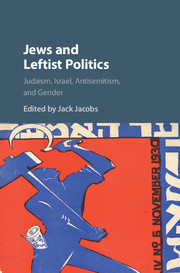Book contents
- Frontmatter
- Contents
- List of Contributors
- Acknowledgments
- Introduction
- PART ONE POLITICAL IMPLICATIONS OF JUDAISM
- PART TWO ANTISEMITISM AND THE LEFT
- PART THREE ISRAEL, ZIONISM, AND THE LEFT
- PART FOUR JEWS AND COMMUNISM
- PART FIVE GENDERED PERSPECTIVES
- PART SIX CANONICAL FIGURES
- 12 Gershom Scholem and the Left
- 13 The Romantic Socialism of Gustav Landauer
- 14 Martin Buber between Left and Right
- PART SEVEN CASE STUDIES
- Glossary
- Index
13 - The Romantic Socialism of Gustav Landauer
from PART SIX - CANONICAL FIGURES
Published online by Cambridge University Press: 13 April 2017
- Frontmatter
- Contents
- List of Contributors
- Acknowledgments
- Introduction
- PART ONE POLITICAL IMPLICATIONS OF JUDAISM
- PART TWO ANTISEMITISM AND THE LEFT
- PART THREE ISRAEL, ZIONISM, AND THE LEFT
- PART FOUR JEWS AND COMMUNISM
- PART FIVE GENDERED PERSPECTIVES
- PART SIX CANONICAL FIGURES
- 12 Gershom Scholem and the Left
- 13 The Romantic Socialism of Gustav Landauer
- 14 Martin Buber between Left and Right
- PART SEVEN CASE STUDIES
- Glossary
- Index
Summary
Gustav Landauer was above all a revolutionary romantic. This is the common root of both his messianism and his anarchist utopia. Revolutionary romanticism shaped his worldview in an almost “ideal-typical” way. One can hardly find another author in whose work past and future, conservatism and revolution, were so directly connected, so intimately articulated, in a radical restorative/utopian dialectic. His singular thought has been defined by modern historians as “an anarchist Jewish messianism.”
Gustav Landauer's romantic utopian vision made him into a twentieth-century “prophet of community.” By “prophet” I do not mean an oracle who pretends to foresee the future, bu, in the truly biblical meaning he who warns the people of the impending catastrophe and calls for action before it is too late. “Utopian” should not be understood as “an ardent but impractical reformer” but as the partisan of a just and humane social order that does not –yet – exist anywhere (the original meaning of the Greek word u-topos).
And by “romanticism” I mean not just a German literary school from the beginning of the nineteenth century, but a powerful movement of protest against modern bourgeois/industrial civilization in the name of past social, cultural, or religious values, a movement that runs through modern culture from Jean-Jacques Rousseau until our day. The romantic protest is aimed against the cold, utilitarian, calculating spirit of the modern (capitalist) age – what Max Weber called Rechenhaftigkeit – against the mechanization and reification of the soul, and above all against what Weber called die Entzauberung der Welt [disenchantment of the world]. To a large extent, romanticism is a nostalgic and often desperate attempt to reenchant the world, through poetry, myth, religion, mysticism, utopia. A powerful current in Central European culture at the beginning of the twentieth century, it usually took a conservative and restorative character – the main exception being Jewish intellectuals, among whom we often find romantic socialist, utopian, or revolutionary tendencies. The anarchist Gustav Landauer, of course, belonged to this last tendency.
What did romanticism mean to him? First of all, the rejection of bourgeois vulgar mediocrity, of what was called, among German poets and artists, Philistertum. In an autobiographical article written in 1913 Landauer described the atmosphere of his youth as a rebellion against the family milieu, as “the unceasing clash of a romantic nostalgia against narrow Philistine barriers [enge Philisterschranken].”
- Type
- Chapter
- Information
- Jews and Leftist PoliticsJudaism, Israel, Antisemitism, and Gender, pp. 252 - 266Publisher: Cambridge University PressPrint publication year: 2017



